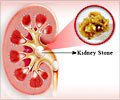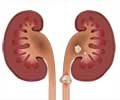Factors secreted by Oxalobacter formigenes reduce urinary secretion of oxalate thereby lowering the risk of kidney stones.
Highlights
- Oxalate is a small anion that is derived from food sources.
- The dietary oxalate is absorbed by the intestine and it increases the urinary oxalate output which ups the risk of developing kidney stones.
- Oxalobacter formigenes (Of) present in the gut, metabolizes the oxalate by using it as a primary energy source.
- This oxalate degradation by factors secreted by Of reduces the urinary oxalate secretion and the risk of developing kidney stones.
Kidney stones are small, hard mineral deposits. They can occur in any part of the urinary tract from the kidneys to the bladder. Usually the stones are small crystals that can be passed through the urine. It can be managed by drinking lots of water and taking pain-killers.
But if the stones continue to grow and pass into the urine collecting unit where it causes obstruction and pain, surgical intervention may be required. Around 80% of these stones are composed of calcium oxalate.
Oxalate is a small anion that is derived from endogenous and exogenous sources. It is formed in the liver by amino acid catabolism. It is also present in certain vegetables, fruits, nuts, grains, legumes, coffee, chocolates etc. It combines with cations like calcium, to form calcium oxalate kidney stones. Intestinal absorption of dietary oxalate can increase the urinary oxalate secretion. The higher the concentration of oxalate secreted in the urine, the more the risk of developing kidney stones.
Oxalobacter formigenes is a Gram negative, anaerobic bacterium that is present in large proportions in a normal adult gut. It plays a major role in balancing levels of oxalate. It helps to metabolize oxalate in the intestinal tract by using it as an exclusive energy source. The absence of Oxalobacter formigenes causes increased absorption of oxalate in the colon causing increased secretion of oxalate in the urine and predisposistion to calcium oxalate kidney stones.
Hatim Hassan, MD, PhD (University of Chicago) and his colleagues found that factors which are secreted by Of can stimulate transportation of oxalate by human intestinal cells grown in tissue culture.
Importantly, the Oxalobacter formigenes factors reduced urinary oxalate excretion in mice by more than 32.5% . This was done by stimulating colonic oxalate secretion.
“Probiotic bacteria have several health benefits; however, the difficulties in determining intestinal bacterial bioavailability and biosafety concerns when administering live probiotics are potential problems facing current probiotics clinical applications. Developing probiotics-derived factors as novel therapeutic agents is an alternative approach that addresses such concerns,” said Dr. Hassan. “The fact that these factors retain their biological activity and can effectively reduce urinary oxalate excretion in mice indicates their significant potential as novel therapeutic agents, and provides a compelling reason for the aggressive pursuit of their characterization, which is currently underway.”
Health Benefits of Taking Probiotics
Probiotics are microorganisms that offer health benefits and play an important role in regulating and maintaining intestinal health. They are naturally found in fermented food products with active-live cultures like yogurt. It is also supplemented through capsules, liquid and chewable forms.
- Irritable Bowel Syndrome (IBS) - For people with IBS, it helps reduce symptoms like bloating and flatulence.
- Diarrhea and Other Food-borne Illness - It helps to restore the useful bacteria and kills or inhibits the growth of harmful bacteria.
- Vaginal Health - Oral and vaginal administration of certain probiotics like Lactobacilli can help in the treatment of bacterial vaginosis. Vaginosis, if not treated can cause complications associated with pregnancy and pelvic-inflammatory disease.
- Urinary Health - The use of probiotics has shown to reduce the rate of recurrent urinary tract infection (UTI) that mainly affects women. It can also reduce urinary oxalate secretion which helps reduce the risk of developing kidney stones.
- Skin Conditions - In certain skin conditions like eczema, probiotics have shown to reduce inflammation and provide protection against immune dysfunction.
- Oxalobacter formigenes May Reduce the Risk of Calcium Oxalate Kidney Stones - (https://www.ncbi.nlm.nih.gov/pmc/articles/PMC2396938/)
- Oxalobacter formigenes and Its Potential Role in Human Health - (http://aem.asm.org/content/68/8/3841.full)
- Kidney stones - (http://www.mayoclinic.org/diseases-conditions/kidney-stones/basics/definition/con-20024829)
- Kidneys Facts - (https://www.kidney.org/news/newsroom/factsheets/FastFacts)
















